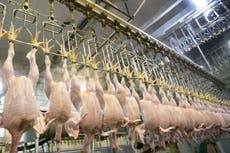Antibiotics banned in UK but fed to US animals ‘may undermine drugs for cancer, Covid and infections’
Ban on hormone beef and chlorinated chicken in UK-US trade deal would not be enough to protect consumers, report warns

Your support helps us to tell the story
From reproductive rights to climate change to Big Tech, The Independent is on the ground when the story is developing. Whether it's investigating the financials of Elon Musk's pro-Trump PAC or producing our latest documentary, 'The A Word', which shines a light on the American women fighting for reproductive rights, we know how important it is to parse out the facts from the messaging.
At such a critical moment in US history, we need reporters on the ground. Your donation allows us to keep sending journalists to speak to both sides of the story.
The Independent is trusted by Americans across the entire political spectrum. And unlike many other quality news outlets, we choose not to lock Americans out of our reporting and analysis with paywalls. We believe quality journalism should be available to everyone, paid for by those who can afford it.
Your support makes all the difference.US-reared animals whose meat is set to be imported under post-Brexit trade deals are fed 10 antibiotics banned in the UK, potentially undermining treatments for infections, cancer and even coronavirus, a report has warned.
Bringing the meat into the UK would be a seriously backward step in the fight against antibiotic resistance, and consuming the meat itself could create a cancer risk, according to the Sustainable Food Trust (SFT.)
Such imports would also be “a major slap in the face for British farmers”, and it would be “completely irresponsible” to allow them, the author of the trust’s report claimed.
The research concluded simply banning hormone-treated beef and chlorine-washed chicken would not be enough to protect UK consumers if a trade deal is agreed between the UK and the US.
The report identified 10 antibiotics banned in Britain that are used to promote animal growth or kill parasites on US factory farms rearing cattle, pigs, chickens and turkeys.
Such widespread routine use creates the ideal conditions for the development of antibiotic resistance, according to Richard Young, the report’s author and policy director of the SFT.
“In one case (that of carbadox) the principal concern is not antibiotic resistance, but the drug’s carcinogenic properties and the potential for residues in pig meat. The [Food and Drug Administration] has been facing strong opposition from the industry for four years over its attempts to ban this antibiotic in pig production,” the report said.
Carbadox should be banned immediately due to the risk, it urged.
“There are human health concerns about meat produced with each of the products covered in this report. Some are immediate, others are more long-term and relate to the compromising of antibiotics identified as having the potential to treat hospital superbugs, cure cancer and even, in one case, treat Covid-19,” the report added.
Mr Young also highlighted “long-term antibiotic-resistance concerns” about the other drugs used.
If and when the government agrees a free-trade deal with the US, meat is still likely to be on the agenda, although the EU trade deal reduces the urgency for an agreement.
The report, Maximum Growth: Whatever the Cost, refers to EU proposals to ban all preventative use of antibiotics in animals from 2022 and to require producers exporting chicken to the EU to do the same, adding: “The UK government accepts that preventative use needs to be reduced, but appears reluctant to go along with this latest, precautionary, move by the EU.”
Meanwhile, US beef cattle, pigs and turkeys are also fed a growth additive called ractopamine, which is banned in the UK, EU, Russia and China on food-safety grounds because of concern about “possible detrimental impacts on heart and cardiovascular health, from residues of the drug in meat and offal”.
Russian regulators have linked ractopamine with shorter human lifespans.
In a letter to environment secretary George Eustice, Mr Young wrote: “Given the growing worldwide problem of antimicrobial resistance, it would be completely irresponsible if the government were to allow the importation of beef, pork or poultry meat produced with the use of antibiotics for growth promotion which have been banned here, or the use of antibiotics that are licensed in the UK but used in the US for disease suppression in ways that would be illegal here.”
Daily use of low-level antibiotics is far more likely to lead to antibiotic resistance than short treatments at full levels, if and when disease occurs, he warned.
“Allowing the importation of meat produced in ways not allowed here would be a major slap in the face for British farmers and a seriously backward step in the fight against antimicrobial resistance.”
The UK has adopted into law an EU ban on the import and production of meat using growth promoting hormones but is expected to come under pressure to drop the ban to sign trade deals.
Since 2015, UK farmers have reduced their use of antibiotics by 43 per cent. But US farmers use more than five times as much per kilogramme of meat produced, and eight times more for beef and turkey meat.
The US Centers for Disease Control and Prevention reported last year that 2.8 million antibiotic-resistant infections occur in the country every year and 35,000 people die — up from 23,000 in 2013.
Mr Young told The Independent it seemed likely the UK’s main sources of imported pork would remain Denmark, the Netherlands and Germany. But he added: “A free trade deal with the US could make the UK a potential market for US poultry meat, since our main sources of imports are currently non-EU anyway. And once we have a free-trade deal with the US, the US and EU will be competing on an equal footing, except for production standards, where those in the US are much lower.”
A spokesman for the Department for Environment, Food and Rural Affairs said: “This government has been clear that we will not compromise on our world-leading environmental protections, animal welfare and food standards.
“The UK already prohibits the use of artificial growth hormones in both domestic production and imported products – and this will continue after the transition period.
“Furthermore all agri-food products imported into the UK under existing or future free-trade agreements will, as now, have to comply with our import requirements, which includes clear limits of veterinary medicine residues in meat and other animal products.”





Join our commenting forum
Join thought-provoking conversations, follow other Independent readers and see their replies
Comments